Pre-employment screening is like a superpower for recruiters. It helps identify the best candidates by evaluating their skills and qualities, making the hiring process smoother and more objective.
This blog post aims to compare Adaface and Talogy, two popular assessment platforms. By the end, recruiters will have a clear understanding of which tool better suits their needs.
Table of contents
How does Adaface work?
Adaface is an online assessment platform designed to help organizations streamline their hiring process. It offers a wide variety of tests, covering technical, aptitude, and personality assessments.
Recruiters use Adaface to accurately gauge candidate skills through customized assessments tailored to specific job descriptions. This ensures that only the most suitable candidates move forward in the recruitment process.
Another key advantage of Adaface is its ability to support a diverse range of test types, from coding challenges to situational judgment tests. This versatility allows recruiters to comprehensively evaluate candidates for various roles within their organizations.
One standout feature that sets Adaface apart is its advanced proctoring capabilities. With features like webcam monitoring, browser tracking, and device fingerprinting, Adaface ensures the integrity and authenticity of the assessment process. For more details, visit our Adaface Online Assessment Platform page.
How does Talogy work?
Talogy is a talent assessment platform that combines a variety of testing methods to gauge candidates' skills, personalities, and potential fit for roles. From situational judgment tests to personality assessments, they aim to help employers make informed hiring decisions.
One common use case of Talogy involves situational judgment tests that assess how candidates would act in specific work-related scenarios. These tests help employers identify individuals who are best suited for their company culture and job-specific challenges.
Talogy's strength lies in their well-structured personality tests and situational judgment assessments, which provide intriguing insights into a candidate's behavior and problem-solving skills. This data can be invaluable for understanding how candidates may perform under real-world conditions.
However, Talogy does lack certain flexibility features like customizable assessments tailored specifically to job descriptions, which can limit the extent to which employers can adapt tests to unique hiring needs.
Adaface vs Talogy: Test libraries
Adaface and Talogy both boast a wide range of test libraries designed to accommodate various recruiting needs. While Adaface excels in offering programming tests, personality tests, language tests, and more, Talogy also provides situational judgment and aptitude tests.
Using test libraries effectively can streamline your hiring process by assessing different competencies early on, saving you both time and resources. Companies can make more informed decisions by evaluating not just technical skills but also cognitive and behavioral attributes.
Adaface's test library
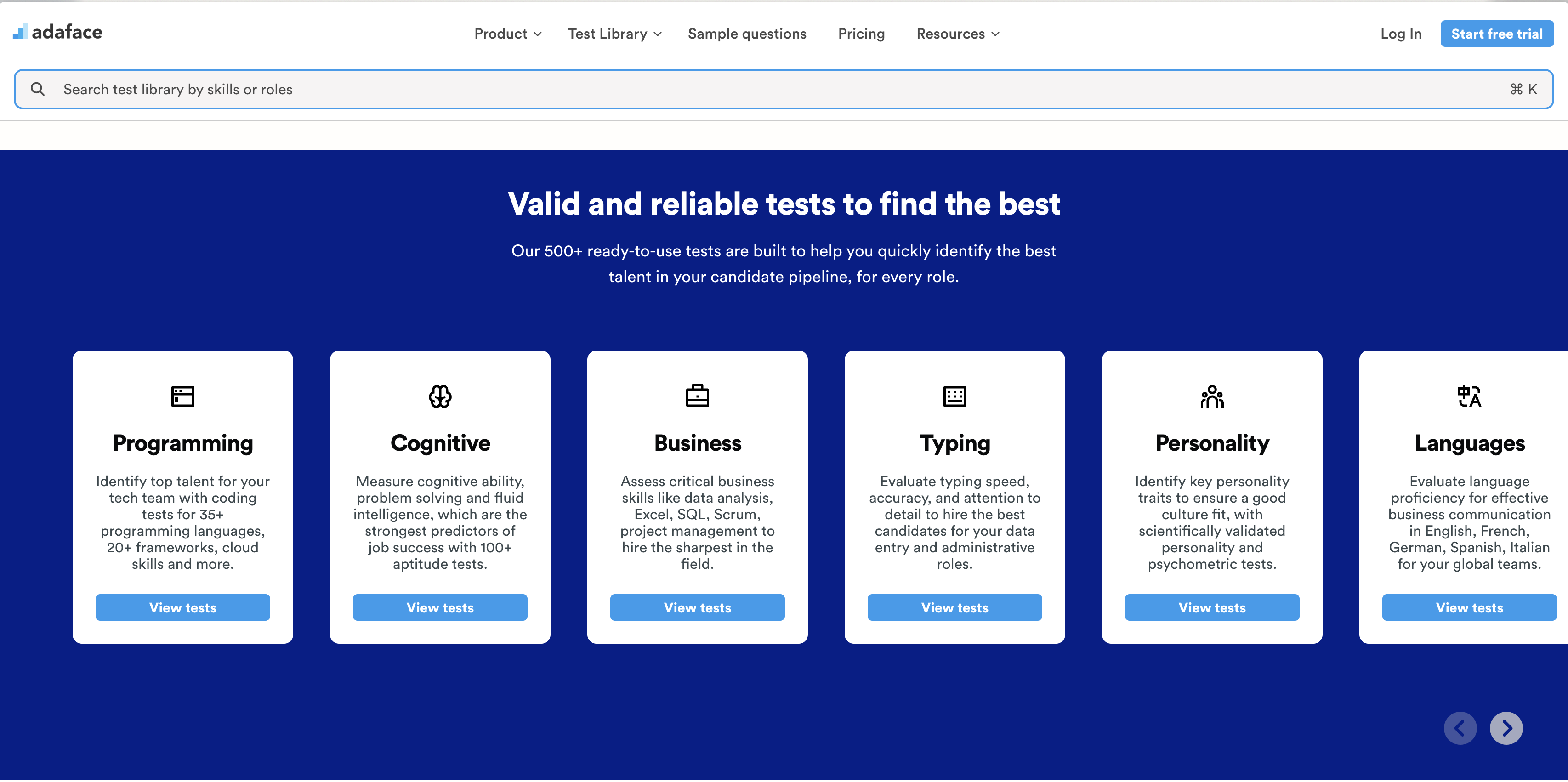
Adaface’s test library is extensive and designed to cater to a plethora of skills. It includes tests for programming, business skills, language proficiency, and even personality assessments, providing a holistic approach to candidate evaluation.
Recruiters love Adaface for its broad spectrum of tests like Pre-Employment Assessment Test Library For 500+ Skills, Role Specific tests, and Personality tests. These tests help in matching candidates to job roles with remarkable precision.
To see the Adaface test library in action, you can create custom tests tailored to your job descriptions, ensuring candidates are tested on relevant skills. Whether you need IT tests, Artificial Intelligence tests, or Accounting/Finance tests, Adaface offers a versatile and user-friendly platform.
Talogy's test library
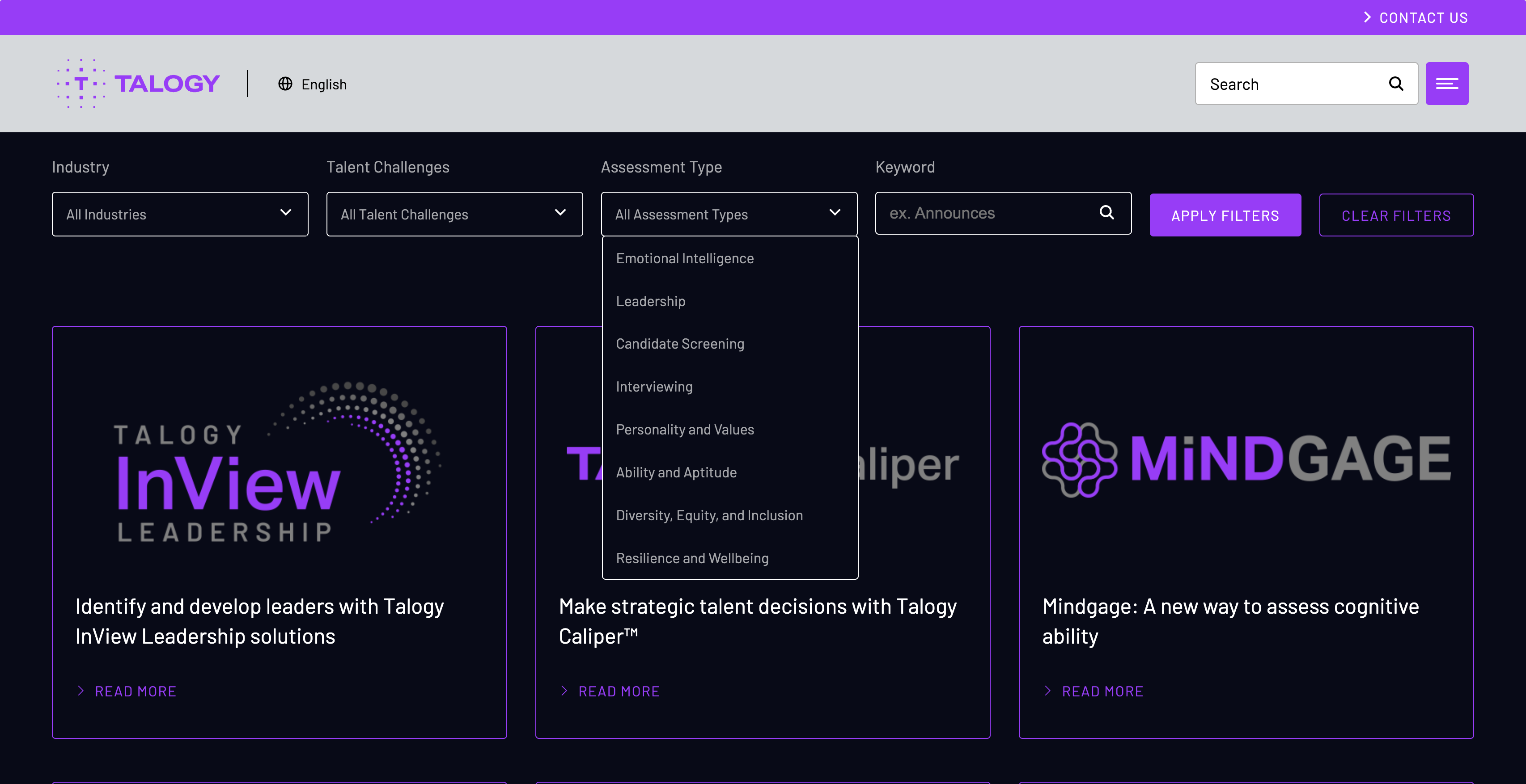
Talogy's test library is quite varied, offering situational judgment and aptitude tests, but it falls short in programming and job-specific assessments. While they have a selection of personality and typing tests, their absence of coding and custom question capabilities means they might not cover every angle employers need.
A key selling point of Talogy’s library is its situational judgment tests, which help employers gauge candidates' decision-making in work-related scenarios. This can provide valuable insights into how potential hires might react under pressure, making it a useful tool for certain assessments.
However, Talogy lacks the ability to create customized tests tailored to specific job descriptions, which can limit how effectively organizations can assess candidates for particular roles. Without this feature, companies may miss out on a more targeted evaluation that aligns closely with their unique hiring needs.
Comparison of test libraries
Adaface vs Talogy: Developer hiring
When hiring developers, you need to assess a candidate's full range of technical skills to see if they align with your team and workload.
Adaface and Talogy both offer platforms for evaluating programming languages, frameworks, and technical aptitude, but they differ significantly in their offerings and approach.
Hiring developers with Adaface
Adaface provides a robust suite of functionalities for hiring developers, including coding questions, automated scoring, and custom test creation. Features like code playback and SQL coding tests ensure a thorough assessment.
Talogy, on the other hand, lacks the depth in developer-specific functionalities. It does not offer programming language coding questions, web/mobile framework questions, or advanced features like Excel workbook questions.
Adaface stands out with a variety of functionalities tailored for developer hiring:
- Web and mobile framework questions
- Data structures and algorithm questions
- SQL coding and Excel workbook questions
- Code playback and automated scoring
- Custom coding questions
Recruiters use Adaface to comprehensively evaluate a candidate's hands-on coding skills and technical knowledge quickly. Customizable tests make it possible to tailor assessments to specific job requirements.
Additional features like code playback and automated scoring make the process smoother for hiring managers, saving time while ensuring high-quality candidate evaluation. Explore Adaface's IT tests and Role Specific tests.
Hiring developers with Talogy
Talogy offers a range of assessments for various roles, but when it comes to programming assessments, the options are quite limited. They currently do not provide specific coding questions, web framework questions, or data structure and algorithm evaluations, leaving a gap for tech roles. This could be a stumbling block for companies looking to gauge developer skills thoroughly.
While Talogy does have a test library that supports some assessment needs, the absence of coding-specific questions restricts hiring managers in the developer space. For example, companies may find it challenging to evaluate a candidate's practical coding ability or their familiarity with popular frameworks, which are crucial for developer roles.
Moreover, Talogy lacks features like code playback and automated scoring, which can streamline the assessment process. This means hiring managers may need to spend extra time manually reviewing code submissions, missing out on the efficiency that comes with automated systems. These missing elements can hinder a smooth hiring experience for tech talent.
Comparison of developer hiring features
Adaface vs Talogy: Candidate experience and company branding
Candidate experience and company branding are at the heart of any successful recruitment strategy. When candidates feel valued and engaged, they're more likely to complete assessments, resulting in a higher quality talent pool.
Features that significantly affect candidate experience include the user interface, mobile compatibility, and support options. Equally important are elements that reinforce your company's brand, like customizable invitations and company logos.
Candidate experience and company branding with Adaface
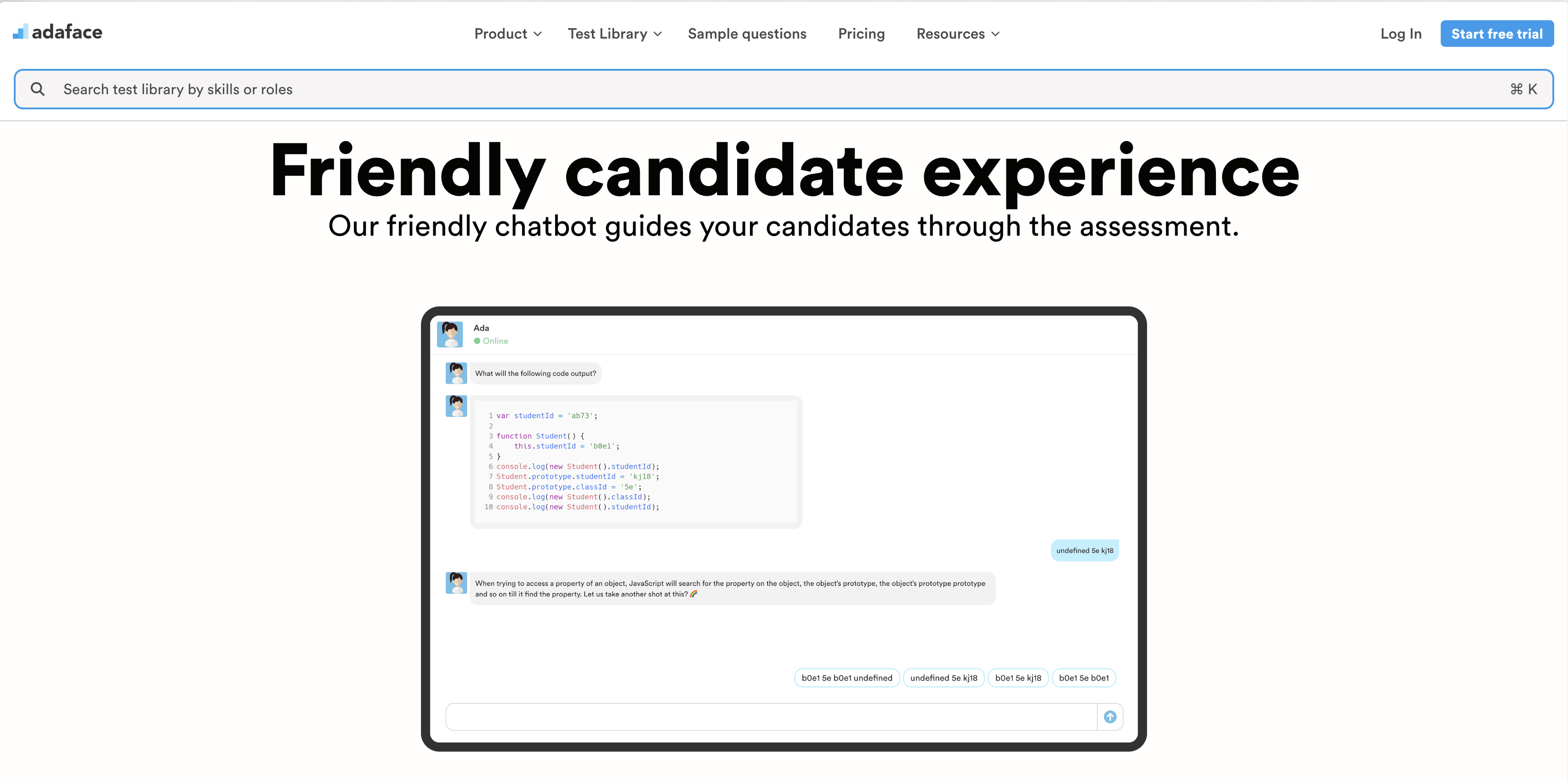
Adaface's conversational interface sets it apart, turning assessments into engaging dialogues. This approach makes candidates feel more at ease, improving participation and completion rates.
Adaface also excels in keeping the tests mobile-friendly. Candidates can take assessments on the go, which is particularly handy for non-coding tests.
Customization options, such as incorporating company logos and brand colors, are available. These features ensure that the assessment process aligns with your company's overall branding, giving a consistent and polished candidate experience.
Candidate experience and company branding with Talogy
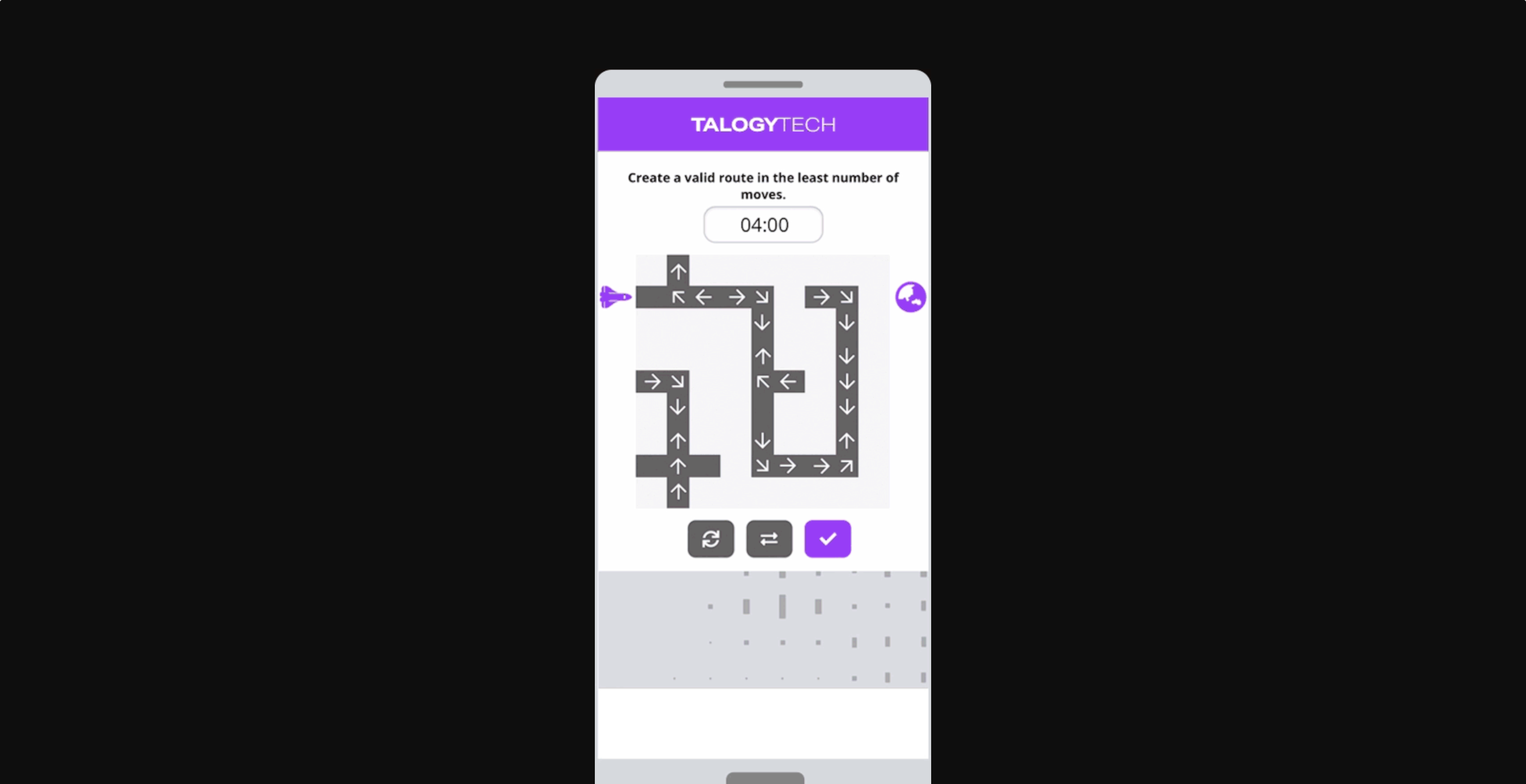
Talogy offers a conversational interface that aims to create a friendlier candidate experience compared to traditional assessments. Candidates can complete tests on mobile devices, making it easier for them to participate. However, the assessments can take quite a bit of time, ranging from 30 to 60 minutes, which might not be the most appealing for busy applicants.
When it comes to company branding, Talogy allows organizations to showcase their logo and brand colors throughout the assessment process. This helps maintain a consistent brand image, but there’s uncertainty around customizable invitation templates, which can limit personalization in candidate communication. Overall, Talogy’s approach gives candidates a sense of the company's identity.
A great candidate experience can significantly enhance a company’s image and attract top talent. While Talogy does offer a branded experience, the lack of qualifying questions means candidates may end up taking longer assessments that don’t align with their skills. This oversight could lead to disengagement, impacting both the candidate’s experience and the company’s branding efforts.
Adaface vs Talogy: Anti-cheating features
When it comes to online assessments, a solid anti-cheating framework is a must-have. Recruiters need assurance that candidates are evaluated fairly, and effective proctoring features play a key role in maintaining that integrity.
Anti-cheating features of Adaface
Adaface offers a suite of anti-cheating features that ensure a fair testing environment. These include:
- User Authentication: Candidates undergo email verification before starting the test.
- Time Limits: Custom time restrictions help keep candidates focused.
- Web and Webcam Proctoring: Both browser activity and webcam usage are monitored.
- Full-Screen Monitoring: Candidates are required to stay in full-screen mode throughout the assessment.
Additionally, Adaface employs advanced techniques to thwart cheating. This includes location logging to track where tests are taken, IP proctoring to flag suspicious activity, and device fingerprinting to identify if multiple candidates are using the same device. On top of that, the platform has plagiarism detection and copy-paste protection to further secure the integrity of assessments.
For more insights, explore our guide on online remote proctoring.
Anti-cheating features of Talogy
Talogy employs various anti-cheating features such as user authentication, time limits on tests, and both web and webcam proctoring. These measures aim to maintain test integrity by ensuring candidates are who they say they are and aren't getting any extra help during assessments.
The platform's webcam monitoring can help recruiters feel assured that candidates are present and focused on the test. This feature is particularly useful in high-stakes environments where accuracy in evaluation matters, offering a layer of security against dishonest behaviors.
However, Talogy lacks several advanced features that could enhance its proctoring capabilities. For instance, without IP tracking and comprehensive device fingerprinting, there's a potential gap in understanding if candidates are collaborating or using the same device, which could lead to unanswered questions about the fairness of results.
Comparison of anti-cheating features
Adaface vs Talogy: Pricing and free trial
Pricing for assessment tools can range from budget-friendly options to premium plans, depending on the features and scale of your hiring needs. Recruiters should expect to find a variety of pricing models tailored to different stages of company growth.
Adaface pricing
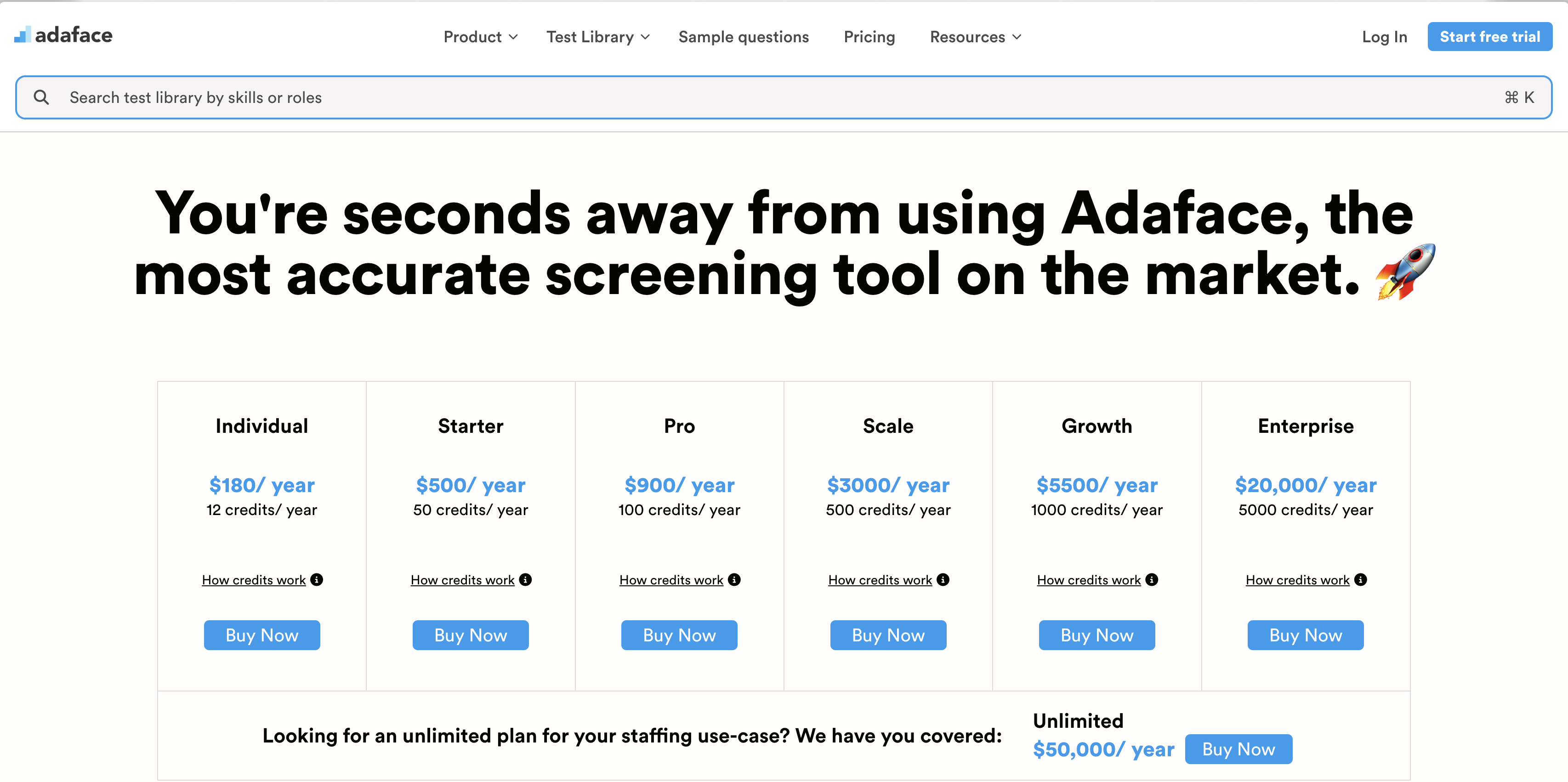
Adaface offers transparent and flexible pricing plans that cater to different business needs. We provide a free trial, allowing recruiters to explore all features before committing.
Our pricing plans include:
- Individual at $180: Ideal for small-scale hiring.
- Starter at $500 for 50 credits: Perfect for growing teams.
- Scale at $3000 for 500 credits: Designed for scaling businesses.
- Growth at $5500 for 1000 credits: Best for larger hiring needs.
- Enterprise at $20000 for 4000 credits: Tailored for extensive hiring requirements.
When considering our pricing plans, companies should evaluate their current and future hiring needs. For more details, visit our Adaface Pricing page.
Talogy pricing
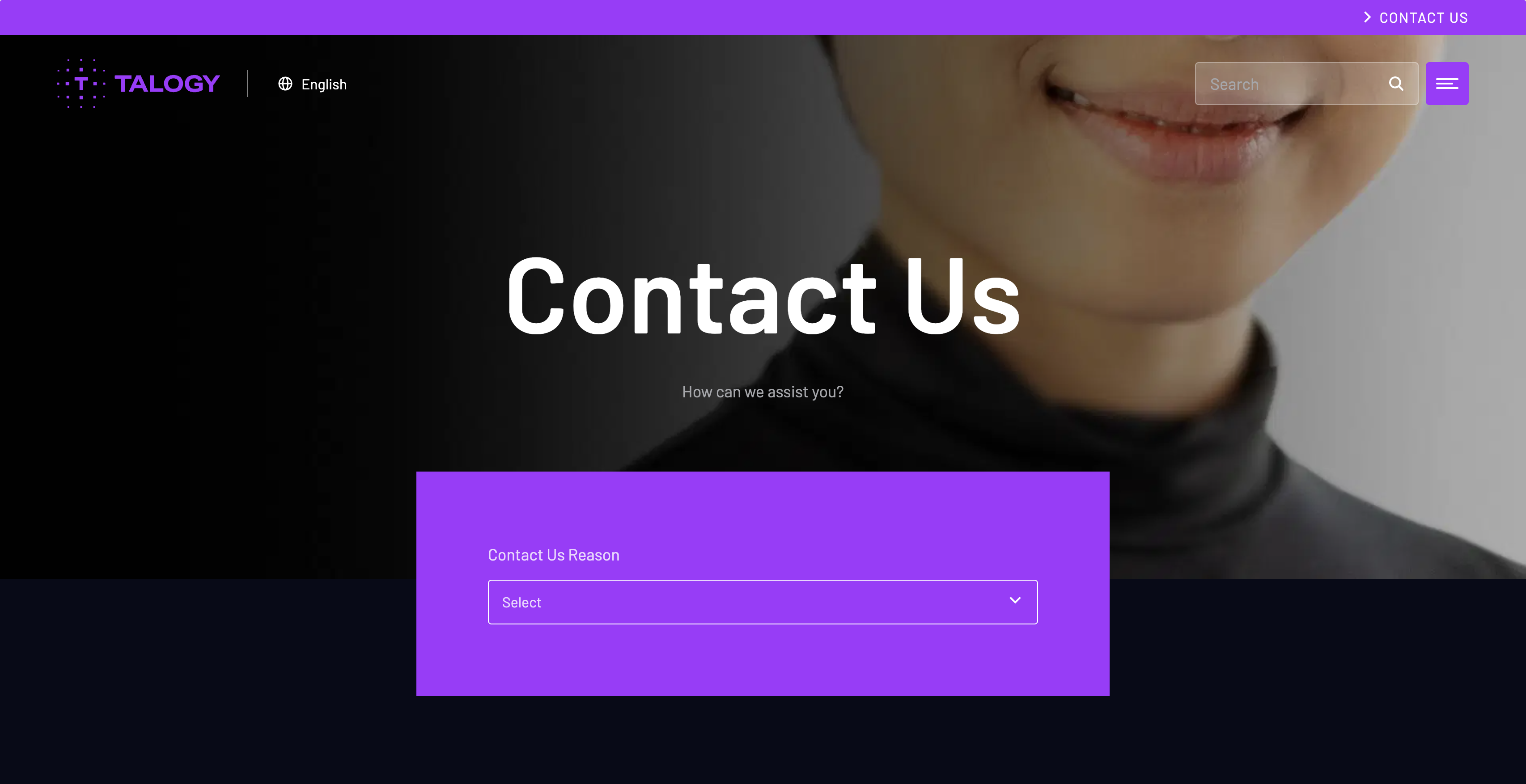
Talogy's pricing structure isn't as straightforward as one might hope. They offer several plans, but details aren't readily available online, which can feel like a treasure hunt for pricing information. Here’s a brief glimpse of what they provide:
- Individual Plan: Contact Talogy for pricing.
- Starter Plan: Pricing also available upon inquiry.
- Scale Plan: Custom pricing based on needs.
- Growth Plan: Same story, reach out to them for details.
- Enterprise Plan: Contact for a quote.
- Unlimited Plan: No listed price; again, reach out to their team.
What’s intriguing is the lack of transparency in Talogy’s pricing. Potential customers may find themselves needing to contact sales for basic information, which can slow the decision-making process. Without options for free trials or immediate sign-up, companies might miss out on getting a feel for the platform before committing. This might leave you wishing for more upfront clarity, especially when evaluating your best fit for assessment solutions.
Comparison of pricing
Adaface vs Talogy: Scorecards, reporting and analytics
Good scorecards, reporting, and analytics features are key to making informed hiring decisions. Recruiters need platforms that provide clear, detailed, and easily shareable reports to understand candidate performance and compare candidates effectively.
Adaface scorecards, reporting and analytics
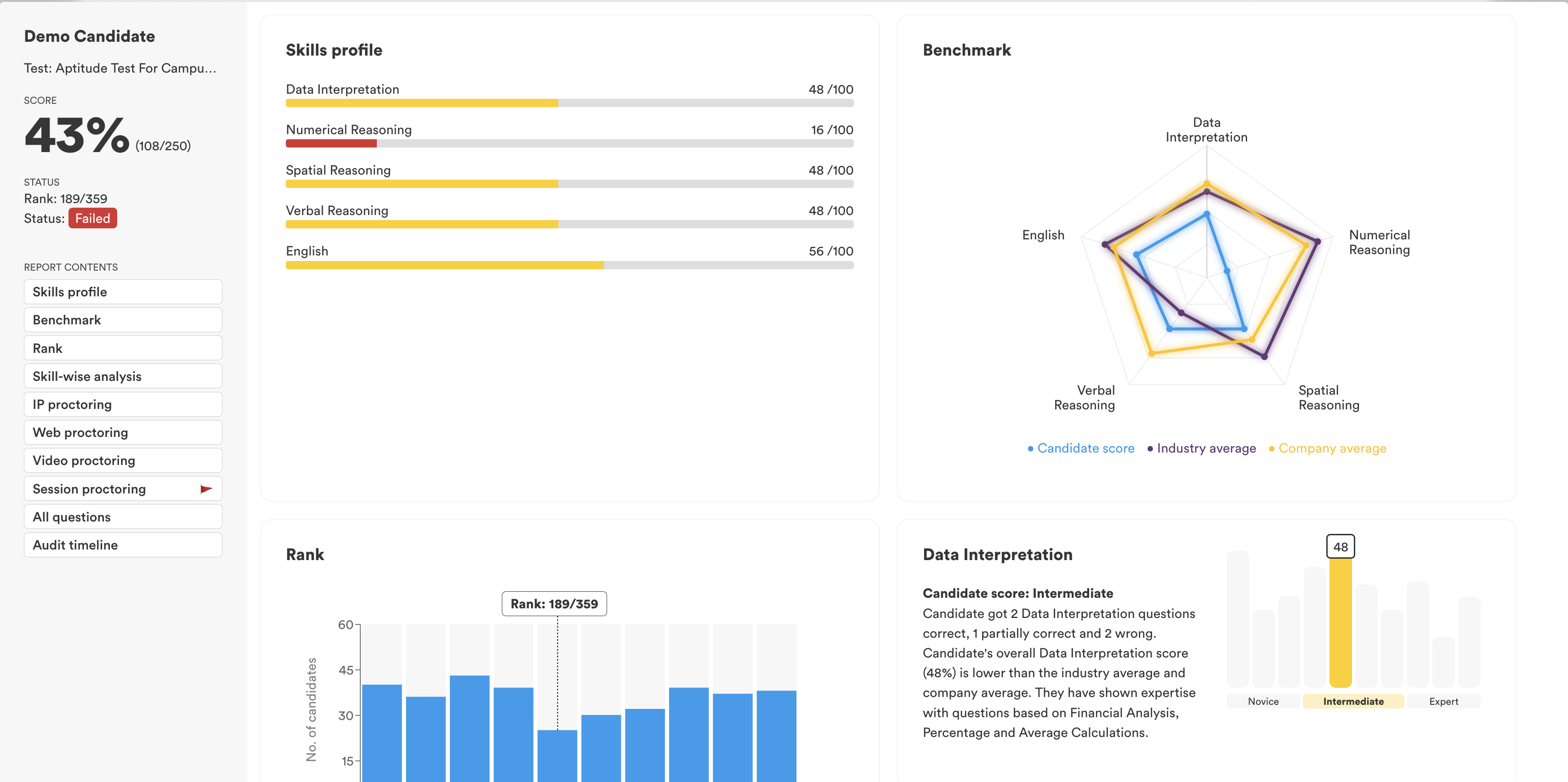
Adaface excels in offering detailed scorecards and analytics that are easily accessible and exportable. You can download reports in PDF, Excel, and CSV formats, making it easy to share and analyze data internally or with clients.
For a quick glance, Adaface's skills profile and skill-wise analysis give recruiters precise insights into a candidate's strengths and weaknesses. This includes radar charts that compare candidate scores with industry standards and company averages.
Adaface also offers a public report feature, which generates unique links to share candidate reports with clients without needing them to log into the dashboard. Additionally, Adaface provides an audit timeline covering all proctoring logs, aiding in detailed candidate assessments.
Moreover, Adaface's benchmarking feature allows recruiters to see how a candidate ranks among peers, while the automated scorecard generation and alerts ensure recruiters can act quickly on top talent.
Talogy scorecards, reporting and analytics
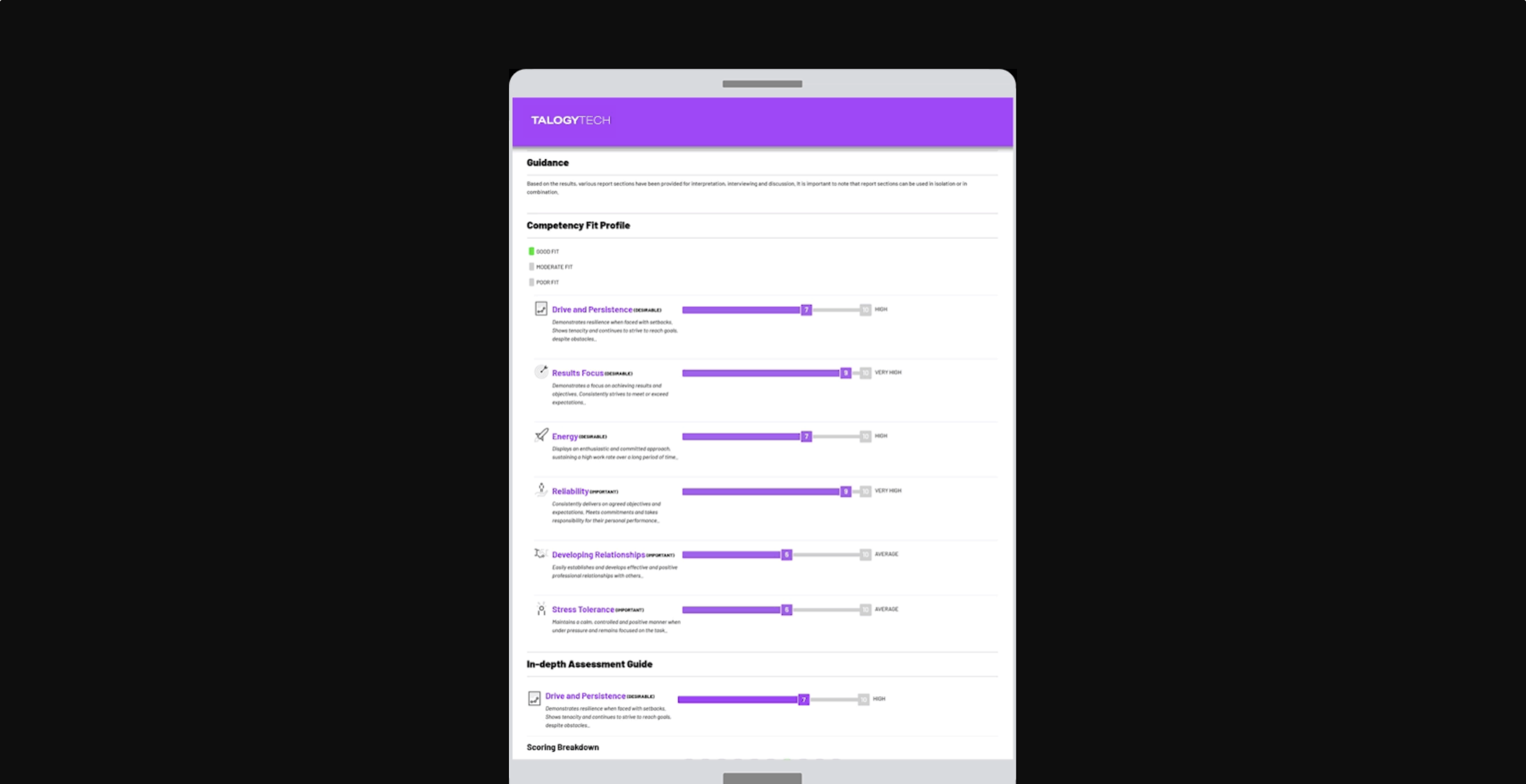
Talogy offers various reporting features, including the ability to generate PDF, Excel, and CSV reports. These formats provide flexibility for internal evaluation and sharing with team members or clients.
Benchmarking is another key aspect of Talogy’s scorecards, allowing recruiters to compare candidates against others in the talent pool. This feature helps in identifying top performers and making informed hiring decisions.
However, Talogy’s reporting lacks detailed skill-wise analysis and audit timelines, which could limit a recruiter’s ability to dive deep into a candidate's specific strengths and weaknesses. The absence of a skills profile also means recruiters might miss out on a quick snapshot of a candidate’s performance across multiple skills.
Comparison of scorecards, reporting and analytics
Adaface vs Talogy: Enterprise and startup friendliness
An ideal assessment product for enterprises and startups should seamlessly integrate with existing systems, be compliant with relevant regulations, and offer flexibility in data management. Such features ensure scalability, security, and ease of use.
Adaface's enterprise and startup friendliness
Adaface shines with its integration capabilities, supporting all popular ATS systems which streamline the hiring process without leaving your HR ecosystem. This makes it a top choice for enterprise users looking to optimize their workflows.
For enterprises with specific data compliance needs, Adaface offers custom data location support. This feature ensures that sensitive data adheres to regional regulations, a service not offered by Talogy.
Startups benefit from Adaface's unlimited team seats in all plans. This allows growing teams to collaborate effectively without worrying about additional costs. For more insights on startup recruiting, check out our Recruiting for Startups guide.
Talogy's enterprise and startup friendliness
Talogy offers features like ATS integrations, GDPR compliance, and role-based access, making it suitable for both enterprises and startups. Their ability to perform bulk actions and invite candidates through multiple channels adds a level of convenience for recruiters managing high volumes.
For example, Talogy's bulk invitation feature allows companies to seamlessly invite numerous candidates to assessments, which can be a game changer during mass hiring events. This efficiency helps streamline the hiring process, especially for larger organizations looking to fill positions quickly.
However, Talogy lacks a diverse test library with multiple question sets, which could limit companies in their assessment strategies. Without this flexibility, businesses may find it challenging to adapt to different hiring needs or mitigate the risk of question leaks.
Comparison of enterprise and startup friendliness
Adaface vs Talogy: Conclusion
Both Adaface and Talogy offer features like aptitude tests, personality assessments, and email support. These common features ensure a basic level of candidate evaluation and communication.
Even with these similarities, Adaface stands out with its extensive range of tests, including programming, AI, and finance tests, which Talogy lacks. This makes Adaface more versatile.
Talogy does not offer many job-specific tests or the ability to create custom questions, limiting its flexibility. Recruiters might miss out on tailored assessments crucial for specific roles.
Streamline hiring with skill tests
Adaface, on the other hand, excels in providing custom tests based on job descriptions and a broader test library. This ensures a more accurate and comprehensive evaluation of candidates.
Pre-employment assessments help recruiters by offering various tests that cover technical skills, cognitive abilities, and personality traits. This creates a full picture of each candidate.
By using these assessments, recruiters save time, reduce bias, and ensure they select the most qualified candidates for their roles, leading to better hiring decisions.
Adaface emerges as the superior solution for recruiters. With its extensive test library and customizability, Adaface meets diverse hiring needs. Explore Adaface's platform features or read more on pre-employment assessments to get started.
Adaface vs Talogy FAQs
Adaface offers a wider range of tests including programming, business, and AI tests, which Talogy does not provide. Adaface also supports custom questions and API integrations, unlike Talogy.
Yes, Adaface supports multiple languages with 10 language tests available across different proficiency levels. Talogy does not offer this feature.
Both Adaface and Talogy provide ready-to-use tests. However, Adaface also offers customized tests per job description, which Talogy does not.
Yes, both Adaface and Talogy offer personality and aptitude tests. However, Adaface covers a broader range of aptitude tests.
Adaface provides extensive proctoring features including webcam, web, and IP proctoring, while Talogy offers basic web and webcam proctoring.
Yes, both Adaface and Talogy provide ATS integrations. However, Adaface supports more integrations and also offers a custom API.

40 min skill tests.
No trick questions.
Accurate shortlisting.
We make it easy for you to find the best candidates in your pipeline with a 40 min skills test.
Try for freeRelated posts



